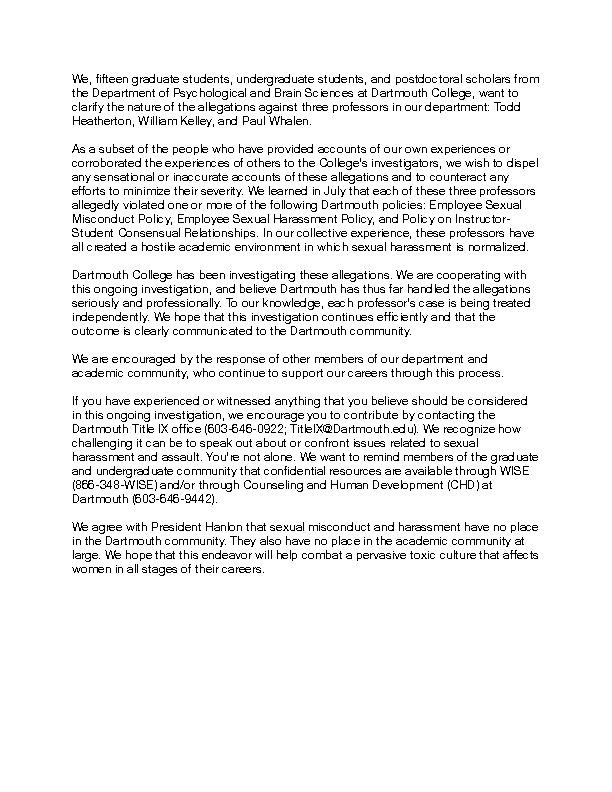
Dartmouth
Todd Heatherton, William Kelley and Paul Whalen are the three Dartmouth professors named in a lawsuit against Dartmouth College by seven women, who detail years of repeated assault from those men.
According to a statement by a Dartmouth spokesman, all three men have lost their tenure and are no longer employed by the college. But the women are still seeking damages from Dartmouth, alleging that even after complaints were filed during their time at Dartmouth, the college encouraged them to continue working with the three professors.
All three professors worked in the Department of Psychological and Brain Sciences. Here’s what you need to know about the three professors:
1. The Lawsuit Alleges That All Three Professors Participated in “Perpetuating an Alcohol-Saturated Party Culture” At Dartmouth
The lawsuit, which has requested $70 million in damages from Dartmouth, alleges that Whalen, Heatherton, and Kelly all participated in a series of inappropriate ways during their time at Dartmouth, including holding lab meetings at bars, encouraging students to snort cocaine in class as part of an “experiment” on addiction, and hosting hot tub parties at their homes with students.
In April 2017, a group of female graduate students contacted the college’s Title IX office and detailed the instances of inappropriate and sexually violating behavior. Their claims went unanswered, the new lawsuit maintains, and twenty days after they first approached Dartmouth, another graduate student was sexually assaulted by Whalen.
Dartmouth president Philip Hanlon said in a statement, “We respectfully, but strongly, disagree with the characterizations of Dartmouth’s actions in the complaint and will respond through our own court filings.”
Hanlon further confirmed that the three professors (in addition to no longer working for Dartmouth) are banned from campus and from attending all Dartmouth-sponsored events.
2. Todd Heatherton Was a Professor of Psychology Who Retired in June
Todd Heatherton opted to retire in June amid recommendations that he lose his tenure and be terminated. Heatherton has co-authored a number of publications running the gamut in the sphere of psychology, from “Binge eating as an escape from self-awareness” to “Losing control: how and why people fail at self-regulation.”
One of the women claimed to CBS that Todd Heatherton grabbed her butt and forced her to sit on his lap at a conference. “Now I had been sexualized in front of a room of potential colleagues,” she said. “I felt humiliated, and I felt extremely angry.”
Heatherton has been accused of groping women’s breasts and butts on multiple occasions. He responded to one particular instance that didn’t have to do with any of the women who have filed the current lawsuit against Dartmouth, but rather a tenured professor at the University of California-Davis named Simine Vazire, who accused him of groping her at a conference in 2002. Vizire came out about her story after hearing of the lawsuit against Dartmouth.
Heatherton since replied to Slate in a statement that read, “I do not remember touching her in any way at a conference 15 years ago. I have just recently heard of this for the first time, but, if I touched her as she described, all I can say is that I am profoundly sorry.”
3. Paul Whalen & William Kelley Both Resigned, But Were Not Able to Technically Retire
Though Heatherton was able to retire, both Whalen and Kelley ended up resigning. This might seem like a small distinction, but retirement allows for the potential to receive benefits in the future, and usually requires that a professor has been working for the institution for a certain length of time.
Dartmouth has confirmed that neither Whalen nor Kelley received any severance payments.
4. Kelley & Whalen Have Both Been Accused of Rape by Two PhD Students
Kristina Rapuano told her story to CBS, claiming that Kelley raped her while attending a conference in California in 2015. “I had thought that I had just been drinking heavily, but now I am unsure,” she said. “He told me that we had sex…I had no memory of it, but I was very clear that I didn’t want it to ever happen again. Rapuano told The New York Times that she left the country briefly in 2016 to get away from Kelley.
Rapuano also alleges in the most recent lawsuit that Whalen invited her over to his office after an exam in 2014, and that he proceeded to turn the light off and begin touching her. She further said that he tried to pin her against the wall and tried to put his hands down her pants, until she forcefully removed his hands.
Whalen reportedly raped Vassiki Chauhan at his own home, after inviting her over. She said to CBS, “I tried to get out of the situaiton, it was only when he started reaching for parts of my body that I was unambiguous about the fact that this was not something I wanted.”
Chauhan added, “It’s really intimidating to come out as a victim rather than as a brain scientist, which is what we came to Dartmouth to be.”
5. In 2017, 15 Graduate Students Signed a Complaint Against the Three Professors & Spoke to Dartmouth’s College Newspaper About the General Partying Atmosphere

The DartmouthStatement by 15 students against Heatherton, Kelley, and Whelan.
In the current lawsuit against Dartmouth, it mentions how the psychology department felt like a “21st-century Animal House.” Those sentiments were reiterated in the earliest complaint against Heatherton, Whelan, and Kelley in 2017, in which an additional eight students spoke out against the professors.
First, the students signed a written statement to the college which read in part, “In our collective experience, these professors have all created a hostile academic environment in which sexual harassment is normalized.”
One student who wished to remain anonymous said to The Dartmouth, “There were clearly points at which I felt like people were testing my boundaries, and if I didn’t immediately push back, that then the next step would make me even more uncomfortable.”
Another student noted events in which the professors would offer up drinks to female students under the guise of being a “good host,” and that “Access to professional opportunities and professional information was specifically associated in participating in casual social events that included alcohol.”
Another student told The Dartmouth, “People turned down other professional opportunities in order to be here, and upon finding out the extent to which these inappropriate behaviors influenced their professional careers, very much wanted to switch.”

